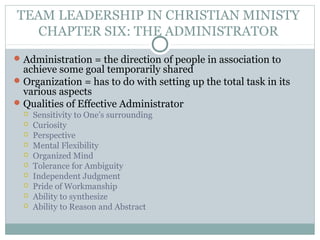Week four powerpoint presentation
- 1. TEAM LEADERSHIP IN CHRISTIAN MINISTY CHAPTER SIX: THE ADMINISTRATOR Administration = the direction of people in association to achieve some goal temporarily shared Organization = has to do with setting up the total task in its various aspects Qualities of Effective Administrator  Sensitivity to One’s surrounding  Curiosity  Perspective  Mental Flexibility  Organized Mind  Tolerance for Ambiguity  Independent Judgment  Pride of Workmanship  Ability to synthesize  Ability to Reason and Abstract
- 2. TEAM LEADERSHIP IN CHRISTIAN MINISTY CHAPTER SIX: THE ADMINISTRATOR Functions of Administration  Planning  Organization  Staffing  Coordinating  Evaluating  Motivating
- 3. TEAM LEADERSHIP IN CHRISTIAN MINISTY CHAPTER SIX: THE ADMINISTRATOR The NT use a greek word that means “to steer a ship” for administration. NT usage  Act 27:11  Revelation 18:17  I Corinthians 12:28  Proverbs 1:5  Proverbs 11:14  Proverbs 24:6  Ezekiel 27:8
- 4. TEAM LEADERSHIP IN CHRISTIAN MINISTY CHAPTER SIX: THE ADMINISTRATOR Leadership Vs Management Practical Implications  Style depends on understanding of administration  Blending of spiritual gifts and leadership roles is more common than biblical days  The gift of administration is a capacity for learning  The gift of administration always involves people
- 5. TEAM LEADERSHIP IN CHRISTIAN MINISTY CHAPTER SEVEN: THE ORGANIZOR Principles of Organization  Should never be viewed as an end in itself  Should always grow out of need  Should be flexible  Should be participatory  Should encourage creativity  Include job analysis and description  Emphasize use of records/report  Clear communication- both written and oral
- 6. TEAM LEADERSHIP IN CHRISTIAN MINISTY CHAPTER SEVEN: THE ORGANIZOR The key resource: Time  Understand how objectives and goals work  Clarify your lifetime objectives  Analyze how you spend your time now  Eliminate time wasters that clutter life  Analyze top priorities  Delegate when possible  Practice self discipline  Centralize your calendar/appointments  Design work schedule that are effective for you  Be smart when studying
- 7. TEAM LEADERSHIP IN CHRISTIAN MINISTY CHAPTER SEVEN: THE ORGANIZOR The informal process (organizational culture)  How are decisions made/communicated?  How are new people hired?  How are funds distributed for various projects?  How is information spread throughout the organization? Job Control  Ensure adequate time to accomplish job tasks  Ensure adequate staff  Ensure adequate resources  Ensure everyone has adequate grasp of mission







